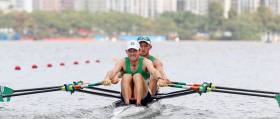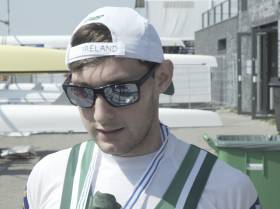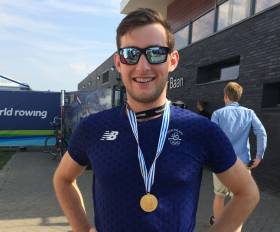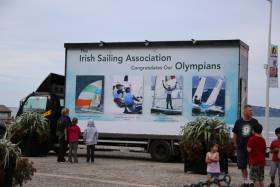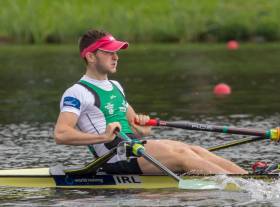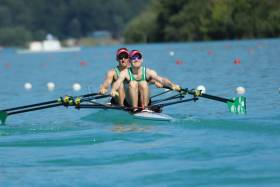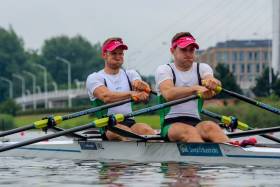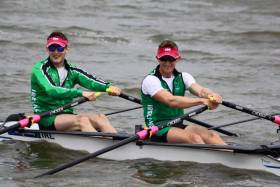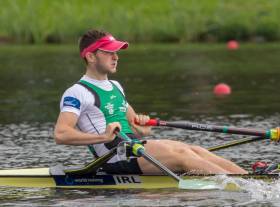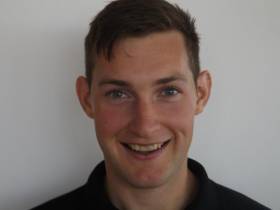Displaying items by tag: Paul O'Donovan
Olympic Medallists Afloat Rowers of the Month
#Rowing: Paul and Gary O’Donovan are the Afloat Rowers of the Month for August. The brothers from West Cork achieved something no Irish crew had done before when they took a silver medal at the Olympic Games regatta in Rio de Janeiro in the lightweight double sculls. The O’Donovans had become European champions in Brandenburg in May. Paul ended the month of August by becoming world champion in the lightweight single sculls in Rotterdam - he was the only competitor who medalled at the Olympic Games and the World Championships.
At a tribute to the entire Ireland Olympic squad in UCD, the great Sean Drea, who finished fourth at the Olympic Games in Montreal in 1976, thanked the Ireland silver medallists. “On behalf of all the fourth-placed Olympians I would like to thank the O’Donovans for taking that monkey off our backs!” he said.
Rower of the Month awards: The judging panel is made up of Liam Gorman, rowing correspondent of The Irish Times, and David O'Brien, editor of Afloat magazine. Monthly awards for achievements during the year will appear on afloat.ie and the overall national award will be presented to the person or crew who, in the judges' opinion, achieved the most notable results in, or made the most significant contribution to rowing during 2016. Keep a monthly eye on progress and watch our 2016 champions list grow.
#Rowing: Paul O'Donovan talks about winning the World Championships with Proteus Paparazzi. The European gold medalist and Olympic silver medalist with his brother Gary will be welcomed back to Skibbereen in a special ceremony on Monday.Thousands are expected to attend.
O'Donovan is World Rowing Champion (VIDEO)
#Rowing: Ireland's Paul O'Donovan is the new champion of the world in the lightweight single sculls. The UCD clubman won the A Final in Rotterdam by clear water from Peter Galambos of Hungary in difficult, windy, conditions.
O'Donovan was sixth at the 500 metre mark, but was already moving. He simply outclassed the field from there. Rajko Hrvat of Slovenia valiantly tried to match him, but repeated pushes by Skibbereen's finest left him behind. O'Donovan then drove on to win. The crowds rose to the new star of world rowing.
Hello and welcome aboard this week’s edition of Seascapes your maritime programme .......glad to be back this week after our break during the Olympic Games in Rio de Janeiro we salute the Irish competitors who participated and congratulate our medal winners and wish our Paralympians every success , writer and broadcaster Hugh Oram relates the tale of how The Celtic Sea came by its name ; we have the results of our Seascapes competition and the winners of those copies of “ Shackleton’s South” as retold by John MacKenna in a Real Reads edition ; first this week to the recent Swim Ireland event at Coosan Point in Athlone ––Ron Coveney and Laura Hannon went along for Seascapes .......... let’s hear first from Mary McMorrow, Operations Manager of Swim Ireland as the National 5 and 10k Championships and Swim for A Mile all part of Waterfest began at the start line..........
Mary McMorrow, Operations Manager, Swim Ireland we can hear next from Marathon Swimmer Steven Miller...
Next to Charlie Lawn at Waterfest, Charlie is Inspector of Navigation with Waterways Ireland...
From Charlie Lawn to some of the winners of the National 5K Championship as Laura Hannon and Ron Coveney greeted them at the finish line at Coosan Point in Athlone....they talked to Adrian Cosgrove of Ennis ; Jordan Sexton of St Fiaccs the National 5K Champion but first to Amy Wolfe of Sandycove Island who was 1st across the line in the Senior Female (wetsuit) in the National 5K Championships..
A final word from Waterfest in Athlone with Kevin Clabby who is Chairman of Inland Waterways Association of Ireland.
The Athlone River Festival and Food Village takes place in the Shannonside town from the Friday 9th of September to Sunday 11th more details on the Waterways Ireland webpage and on the Seascapes webpage....
With all the coverage of the remarkable feat in the lightweight double sculls by the O'Donovan brothers Gary and Paul and the jubilation felt by all involved in Irish rowing circles throughout this island I was drawn to a piece by Alex Clark who wrote in last weekend’s Observer........
“ They do things differently in Skibbereen, as Gary and Paul O Donovan, Ireland’s first –ever rowing medal winners, demonstrated in their post-victory interviews. “
“The lightweight double scullers thrilled as they might have been, were not about to go overboard; rather they explained in Cork’s distinctive sing-song accent they had “done some Nutella, done the podium thing and peed in a cup”
“Back home, the duo rather wistfully explained on Irish (national) broadcaster Raidio Telefis Eireann, “its mad excitement altogether “and Skibbereen was “after closing everything down and having a national holiday and we’re missing it all.” Clark writes “Don’t worry lads: the ‘craic’ will still be ninety when you get home.”
In sailing, Annalise Murphy secured her silver medal after almost a decade of constant training and perseverance and her victory was celebrated in Dun Laoghaire and at her home sailing club The National Yacht Club in Dun Laoghaire , she is now hotly tipped to take on the Moth for Tokyo in four years time. Congratulations also go to the entire Irish sailing squad
Finn Lynch (20) from Carlow and also a National YC sailor was the youngest ever Olympic helm to represent Ireland as well as being the youngest in his 46-strong class. He achieved several notable performances during his ten-race series at Rio including several top 20 results. In an event where the average age of the top ten finishers is 30, he has proven his ability with an Olympic experience under his belt and is certain to be a prospect for Tokyo 2020.
Andrea Brewster and Saskia Tidey from the Royal Irish YC started their campaign together exactly three years ago and sailed the 49erFX class for the new Women’s Skiff event at Rio. Overcoming a three-month injury hiatus to their campaign, they qualified Ireland for the event earlier this year and their form improved steadily in the build-up to the Olympics. Over their 12 race series, they achieved five top ten results and ended their debut Olympic Games in 12th place overall.
Ryan Seaton and Matt McGovern, from Carrickfergus Sailing Club, Ballyholme YC & Royal Ulster YC were the last of the six Irish sailors into action on Guanabara Bay in the Men’s Skiff event Medal Race final. The London 2012 veterans improved on their performance from four years ago by qualifying for the final to place tenth overall. Their results included two race wins in which they beat the four times world champions and eventual Gold medal winners. This ensured they were within reach of the podium going in to the last day of fleet racing.
“This result proves that our strategy in high performance is working and is providing the success that all involved in sailing and sport crave,” commented David Lovegrove, President of the Irish Sailing Association. “I want to acknowledge the tremendous professionalism of our coaching staff who have demonstrated such passion and commitment to our sailors. In particular I want to commend James O’Callaghan’s leadership and guidance of high performance sailing, ably supported by Rory Fitzpatrick.”
“Annalise’s medal confirms the intent of our programme that both delivers the highest standard of performance but also makes a return to our domestic sport,” said James O’Callaghan, ISA Performance Director.
We wish all our Paralympians well in Rio particularly our Paralymic Sailing Team of John Twomey , Ian Costelloe and Austin O Carroll , this is Johns ‘ 11th consecutive games...fair winds...
As the clock counts down to the America’s Cup proper next year, the pressure is building week by week. Pressure for Sir Ben Ainslie’s team, Land Rover Ben Ainslie Racing ; also for the Defenders Oracle Team USA and indeed for all six teams as they fight for the bonus points that could increase their chances next year when the road to the America’s Cup kicks off.
Next to our recent Seascapes competition you may remember that we asked you to name the last vessel on which Sir Ernest Shackleton sailed before his untimely passing the answer as many of you correctly guessed was The Quest, so copies of “Shackletons South “ as retold by John MacKenna are going out to ...
*Kevin O'Halloran, Youghal, Co. Cork
*Marcelline Cody Roscrea Co Tipperary
*Tony O'Connor Malahide, Co. Dublin
A new statue is unveiled in Athy to Sir Ernest Shackleton this coming week and we’ll be there.......
Well from the World of exploration to our coastal waters and the Celtic Sea...........broadcaster and writer Hugh Oram on the how this body of water got its name.........
Hugh Oram and the origins of The Celtic Sea, Hugh’s latest book is a pictorial history of Sandymount, published by The History Press Ireland ...
“ On the sound desk this week Niall O’ Sullivan, next week here on your maritime programme Grainne McPolin heads for Fenit and Tralee Bay for Seascapes and profiles the crane company Liebherr who came to Tralee in 1958 and how the company has expanded , their shipping movements through Fenit and Tralee Bay ..........we’ll meet the Chief Executive Officer of Liebherr , Pat O ‘Leary ; retiree Max McCarthy ; Port Manager - Don O’ Herlihy ; Commodore and Vice Commodore of Tralee Bay Sailing Club Fiona Frawley and Gary Forte and Harbour Master - Batt McCarthy......and we’ll be at the unveiling of that new statue to Sir Ernest Shackleton in Athy .........until next Friday tight lines and fair sailing.”
O'Donovan Dominant in Heat at World Rowing Championships
#Rowing: Paul O’Donovan won his heat with a dominant performance at the World Rowing Championships in Rotterdam today. The Ireland lightweight single sculler made light of the difficult condtions and left the rest of the field behind - Japan’s Yuki Ikeda, in second, was over five seconds behind the UCD clubman. O’Donovan will now have a good lane draw in the quarter-final.
World Rowing Championships, Rotterdam (Selected Results; Irish interest)
Men
Lightweight Single Sculls - Heat Three (Four to Quarter-Finals; rest to Repechages): 1 Ireland (P O’Donovan) 7:11.73, 2 Japan 7:16.87
3 Serbia 7:19.70, 4 China 7:23.04.
Under-23 Quadruple - Repechage One (Three to A/B Semi-Finals; rest to C Final): 1 Britain 5:54.05, 2 Russia 5:56.18, 3 Ireland (D Buckley, J Casey, P Boomer, S McKeown) 5:57.67.
Silver For O'Donovan Brothers in Olympic Rowing Final
#Rowing: Paul and Gary O'Donovan won silver for Ireland at the Olympic Games in Rio de Janeiro today. The young men from Lisheen in Cork produced an outstanding finish, taking the middle place between France and Norway in a three-boat sprint to the line.
As is their way, the O'Donovans hung off the leading group through the early stages, but they were wise enough to not lose touch. By 1500 metres they were second behind eventual winners France. And then the O'Donovans went hunting for gold. France held out as both Ireland and Norway closed on them. Less than three-quarters of a second covered the three crews at the finish.
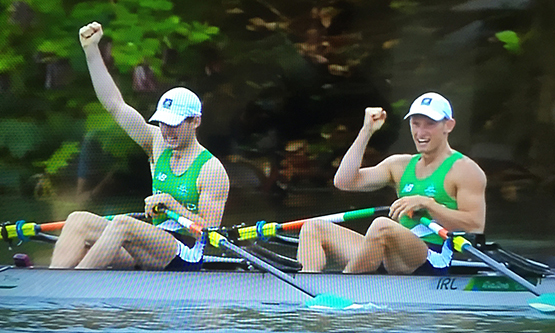 Olympic Silver Medal winners Paul and Gary O'Donovan celebrate Ireland's first ever Olympic rowing medal
Olympic Silver Medal winners Paul and Gary O'Donovan celebrate Ireland's first ever Olympic rowing medal
Olympic Games Regatta, Rio de Janeiro
Men
Lightweight Double Sculls - A Final: 1 France (P Houin, J Azou) 6:30.70, 2 Ireland (G O'Donovan, P O'Donovan) 6:31.23, 3 Norway 6:31.39. B Final (places 7 to 12): 1 Britain (W Fletcher, R Chambers) 6:28.81.
Single Sculls - Semi-Final (Three to A Final; rest to B Final):
4 Britain (A Campbell) 7:09.54.
Women
Lightweight Double Sculls - A Final:
Netherlands 7:04.73, 2 Canada 7:05.88, 3 China 7:06.49; 6 Ireland (C Lambe, S Lynch) 7:13.09.
O'Donovans Secure Second Olympic Rowing Final Place for Ireland
#Rowing: Paul and Gary O'Donovan lifted Ireland into a second Olympic final at Rio de Janeiro today. The men from Lisheen near Skibbereen finished third in their semi-final of the lightweight double sculls. France and the United States set the early pace, with Britain third and Ireland in fourth. The O'Donovans took a marginal lead over Britain at half way and then hunted down the leaders. France held on to take first ahead of the United States, who had just over a half a second over Ireland.
South Africa won the second semi-final, pushing Norway in to second. Poland won a battle for third with Italy. The winning time - six minutes 38.01 seconds - was over three seconds slower than that in Ireland's semi-final.
Olympic Games, Rio de Janeiro (Irish interest; selected results)
Men
Lightweight Double Sculls - Semi-Finals (First Three to A Final; rest to B Final)
Semi-Final One: 1 France 6:34.43, 2 United States 6:35.19, Ireland (G O'Donovan, P O'Donovan) 6:35.70; 4 Britain 6:38.76, 5 Germany 6:59.28, 6 China 7:01.49.
Semi-Final Two: 1 South Africa 6:38.010, 2 Norway 6:38.65, 3 Poland 6:40.23.
Women
Lightweight Double Sculls - Semi-Finals (First Three to A Final; rest to B Final)
Semi-Final One: 1 South Africa 7:19.09, 2 New Zealand 7:19.27, 3 China 7:20.94.
Semi-Final Two: 1 Netherlands 7:13.93, 2 Canada 7:16.35, 3 Ireland (C Lambe, S Lynch) 7:18.24; 4 Denmark 7:20.29, 5 United States 7:22.78, 6 Germany 7:33.21.
#Rowing: Ireland's Paul and Gary O'Donovan won their heat to qualify for the semi-finals of the Olympic Games in Rio de Janeiro. Italy had been seeded in fourth, one place ahead of the O'Donovans in the lightweight double sculls, and the Italians led until the final quarter. However, this was a race on the lines that the O'Donovans have made their own. They were a length down after 500 metres, but were disputing second with Germany by halfway. By 1500 metres the Irish had left Germany in fourth and, with Denmark pushing into third, Ireland dispurted the lead with Italy. Ireland then pushed on to win.
Olympic Games Regatta, Rio de Janeiro (Irish interest; selected results)
Men
Lightweight Double Sculls - Heat One (First Two to A/B Semi-Finals; rest to repechages): 1 Ireland (P O'Donovan, G O'Donovan) 6:23.72, 2 Italy 6:24.10; 3 Denmark 6:33.67, 4 Germany 6:40.48, 5 Turkey 6:41.67.
Women
Lightweight Double Sculls - Heats (First Two to A/B Semi-Finals; rest to repechages): Heat One: 1 China 7:00.13, 2 Denmark 7:01.84. Heat Two: 1 Netherlands 6:57.28, 2 New Zealand 7:02.01.
Heat Three: 1 South Africa 7:07.37, 2 Ireland (C Lambe, S Lynch) 7:10.91; 3 Brazil 7:20.79, 4 Cuba 7:26.43, 5 Tunisia 7:43.33.
Heat Four: 1 Canada 7:03.51, 2 Poland 7:05.02
Single and Double Success Brings O'Donovan Afloat Honour
#Rowing: Paul O’Donovan is set to have an extraordinary August, competing at the Olympic Games in Rio de Janeiro and the World Rowing Championships in Rotterdam. He is named the Afloat Rower of the Month for his achievements in June. Paul and his brother, Gary, continued their impressive run in the lightweight double sculls. They took fourth in the World Cup regatta in Poznan, Poland. They placed ahead of Britain, who were silver medallists at the World Championships in 2015, in both the repechage and the final. Germany, who were sixth last year, could not qualify from the repechage, which was won by Ireland in the fastest time they have done in a race. They head off to a block of training in Spain having moved from 11th in the world last year to a ranking of 5th in the bookies’ odds for Rio.
Paul O’Donovan has been chosen to compete in the lightweight single in Rotterdam. In a shoot-out with Gary at Cork Regatta in the senior single he proved his credentials with a big win. Despite being a lightweight, he is the best single sculler in Ireland.
Rower of the Month awards: The judging panel is made up of Liam Gorman, rowing correspondent of The Irish Times, and David O'Brien, editor of Afloat magazine. Monthly awards for achievements during the year will appear on afloat.ie and the overall national award will be presented to the person or crew who, in the judges' opinion, achieved the most notable results in, or made the most significant contribution to rowing during 2016. Keep a monthly eye on progress and watch our 2016 champions list grow.
Paul O'Donovan Wins Battle of the Brothers
#Rowing: Paul O'Donovan was far and away the fastest single sculler at Cork Regatta at the National Rowing Centre today. The 22-year-old UCD man had a clearwater lead by halfway and beat his younger brother, Gary into second by over eight seconds. The O'Donovans form the Ireland Olympic lightweight double. Paul will go on to represent his country as a lightweight single sculler at the World Championships.
Denise Walsh was a convincing winner of the women's senior single, well ahead of Siobhan McCrohan, while the very promising Cork Boat Club junior crew of Amy Mason and Tara O'Hanlon won the Division One women's pair. Shane O'Driscoll and Mark O'Donovan took the men's senior pair, ahead of the Portora intermediate crew of Ryan Ballantyne and Barney Rix.
The New Ross junior 16 crew had a stirring victory in the women's division two coxed quad, while UCD's club two crew won the men's division two eight.
Cork Regatta (Coillte Grand League), National Rowing Centre, Day One
Men
Eight - Div Two - A Final: 1 UCD (Club 2) 6:10.51; 3 Neptune (jun 18B) 6:26.949; 5 UCD (nov) 6:35.449; 6 Shandon (jun 16) 6:36.01.
Pair - Div One - A Final: 1 Skibbereen (M O'Donovan, S O'Driscoll; sen) 6:47.31, 2 Portora (inter) 7:00.21, 3 Portora (sen) 7:03.97. B Final: UCC 7:09.969; 4 Methodists (jun 18A) 7:27.72. C Final: 1 Commercial B (sen) 7:19.64; 5 Cork (Club 1) 7:39.03.
Sculling, Single - Div One - A Final: 1 UCD (P O'Donovan; sen) 6:55.78, 2 Skibbereen (G O'Donovan; sen) 7:03.98, 3 Portadown (S McKeown; sen) 7:20.81; 4 Shandon (R Byrne; jun 18) 7:21.20; 5 St Michael's (D O'Connor; inter) 7:21.58. B Final: Clonmel (D Lynch; jun 18) 7:20.48; 6 NUIG (T Dillon; lwt) 7:39.37. C Final: Shandon (D Begley; inter) 7:29.43; 2 Carlow (L Keating; Club One) 7:30.86.
Women
Pair - Division One - A Final: 1 Cork A (jun) 7:49.19, 2 UCC (sen) 7:53.55, 3 Bann (inter) 7:59.863. B Final: Queen's/UCC (sen) 8:01.37. C Final: St Michael's (inter) 8:21.57.
Sculling, Quadruple - Div Two, coxed - A Final: 1 New Ross (jun 16) 7:40.26, 2 Cork B (Club 2) 7:41.14; 5 Carlow (jun 18B) 7:48.997. B Final: Waterford (jun 18B) 7:54.796. C Final: Commercial (club 2) 8:18.91; 3 Castleconnell (nov) 8:24.174.
Single - Div One - A Final: 1 Skibbereen (D Walsh; sen) 7:51.57, 2 Tribesmen (S McCrohan; sen) 8:04.30, 3 Skibbereen (O Hayes; sen) 8:09.94; 4 Belfast BC (O Blundell; inter) 8:21.16. B Final: Belfast BC (C Deyermond; club 1) 8:25.96; 2 Neptune (C Feerick; jun 18A) 8:28.71. C Final: Carlow (A Byrne; lwt) 9:05.89.


























